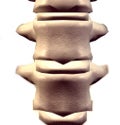Degenerative Disc Disease
Discs are the soft pads between the vertebrae that provide flexibility and absorb the shocks of daily movements. With a tough outer shell and a gel-like center, they break down over time.
As these discs wear down, they don’t always cause problems. When they do though, it’s called degenerative disc disease, and it can result in chronic lower back pain.
At WakeMed, our goal is to help patients with degenerative disc disease get back to an active, pain-free lifestyle as quickly as possible.
Symptoms of Degenerative Disc Disease

The main symptom of degenerative disc disease is chronic pain that’s usually localized in the lower back.
It can fluctuate from mild to severe. Rarely it can become progressively worse.
Causes of Degenerative Disc Disease
Degenerative disc disease can occur naturally, or it can be caused by an injury, such as a twisting injury that damages the disc.
This leads to inflammation, and the disc’s tiny slips and slides can cause irritation and pain in that section of the spine.
Diagnosing Degenerative Disc Disease
Our orthopedists take a detailed history of symptoms and conduct a thorough physical examination to check for signs of degenerative disc disease.
We may use an X-ray to see the position of the vertebrae, as well as the disc space between them. Magnetic resonance imaging (MRI) can also be useful, showing the condition of the disc and the space around it.
Treating Degenerative Disc Disease
Generally, we start treatment conservatively, using anti-inflammatory medications such as ibuprofen as a first-round treatment.
Physical therapy, muscle-strengthening exercises and stretching can also be effective. In some cases, we may prescribe oral steroids or epidural steroid injections.
Patients with severe pain may only get relief with spinal fusion surgery. This procedure minimizes irritation by placing a piece of bone onto the back of the spine, allowing the vertebrae above and below the disc to fuse as the bone graft heals. Metal screws, rods or cages may be needed to hold the bones in place while they heal.
Make an Appointment
We welcome new patients. If you’d like to meet with one of WakeMed’s orthopaedists about degenerative disc disease, please make an appointment by calling us at 919-232-5020.